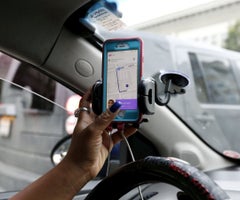MI SELECCIÓN DE NOTICIAS
Noticias personalizadas, de acuerdo a sus temas de interés

Ride-hailing companies Uber Technologies Inc. and Lyft Inc. are planning to give some drivers money to buy stock in their initial public offerings, a rare move that would grant them access to two of the most hotly anticipated IPOs ever.
Both Uber and Lyft’s IPOs will include programs that would give some of their most-active or longest-serving drivers a cash award with an option to put it toward stock in the IPOs, according to people familiar with the matter. It is typically hard for an ordinary investor to buy a company’s stock at its IPO price before it begins trading on an exchange, so this move would give drivers access they likely wouldn’t have had otherwise.
Uber is working out the details of a program expected to be valued in the hundreds of millions of dollars that would give a significant portion of its 3 million active drivers and couriers globally either a cash bonus or the option to use that cash to purchase shares at the IPO price, people familiar with the matter said. These awards will be tiered based on a sliding scale related to the driver’s length of service and number of trips or deliveries, these people said.
In markets outside the U.S., Uber is aware that drivers may not be able to purchase shares because of securities laws, but those who qualify for the cash award would still receive it.
Uber has been working on ways to give drivers shares of the company since 2016, but had encountered a roadblock because of securities laws that make it challenging to give private shares to independent contractors. Uber drivers aren’t full-time employees.
Instead, Uber opted for the path it is taking. Morgan Stanley, which is leading Uber’s IPO, will manage the program to facilitate the purchase of stock at the IPO price, the people familiar with the matter said.
Lyft, meanwhile, intends to give its drivers who have logged at least 10,000 rides on the platform $1,000 that can be kept or used to buy the company’s IPO shares, said people familiar with the plan. Lyft expects only a minority of its drivers will be eligible, these people said, but the plan is designed to recognize the most significant drivers who have helped build the platform.
A Lyft driver who has logged 20,000 rides would be eligible for $10,000 in cash or that equivalent amount of stock, the people said. That many rides is a challenging hurdle: A driver who worked five days a week, 52 weeks a year, for five years would need to average 15.4 rides per workday to reach 20,000 rides. Many drivers split their time between both services, making it harder to rack up big totals for either.
For both companies, it isn’t clear how many drivers are likely to meet the IPO eligibility requirements.
Skylar Buffington, a 31-year-old driver who lives outside Dallas and has worked mostly for Lyft since 2014, is just 200 rides short of 10,000 trips but hopes he can get to that level before the IPO. If he gets the $1,000, Mr. Buffington said he would definitely use it to buy into the IPO.
“I don’t know if I’ll be a driver full time forever, but there’s no reason for me not to take a long position with the stock,” he said. “Why not take on a little risk with what is basically a gift?”
For eligible drivers, getting Uber or Lyft shares at the IPO price could be a big win. The IPOs are expected to be two of the hottest in what could be one of the biggest years for IPOs by dollars raised on record. Shares of these types of IPOs are coveted by investors because they are generally expected to rise significantly when they start trading-the so-called first-day pop. Typically, most IPO shares are allocated to large funds that are expected to hold the stock for a longer term. Individual investors typically struggle to buy stock at the IPO price as so few shares are allotted to go to them.
Still, not all sought-after IPOs amount to big, quick wins. Shares of Facebook Inc., for example, stumbled in the early months of trading despite a huge appetite for them at the time of the IPO. The stock now trades at more than four times its 2012 IPO price.
Uber and Lyft have racked up huge losses as they compete for drivers and riders. With their IPOs, the battle for global investors will become part of the rivalry too.
The move would be the latest from the ride-hailing services to appease its drivers. For example, Uber added tipping in 2017 as an option for passengers; Lyft has allowed tipping since its early days.
Drivers for the services operate as contractors, not employees of the companies, a position that has drawn the ire of some and has in the past been the catalyst of lawsuits against both companies by their drivers.
By Maureen Farrell
El ministro de Asuntos Exteriores ruso, Sergei Lavrov, dijo el lunes que Ucrania intentó atacar una residencia presidencial en la región de Novgorod
El peso mexicano se aprecia, manteniéndose por debajo de la línea de 18 por dólar, en un mercado que espera la publicación de las minutas de la FED.
El comandante estratégico operacional de la Fanb, Domingo Hernández Lárez, señaló que este tipo de acciones forman parte de una estrategia permanente para combatir el uso ilegal del espacio aéreo